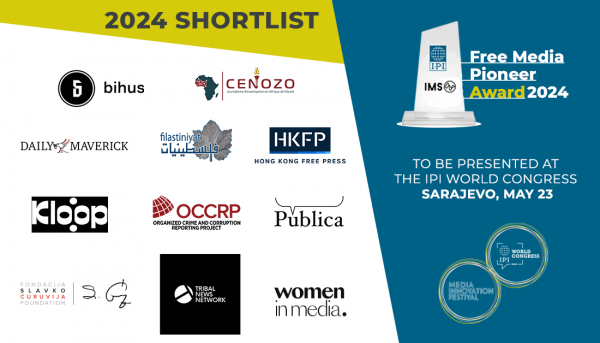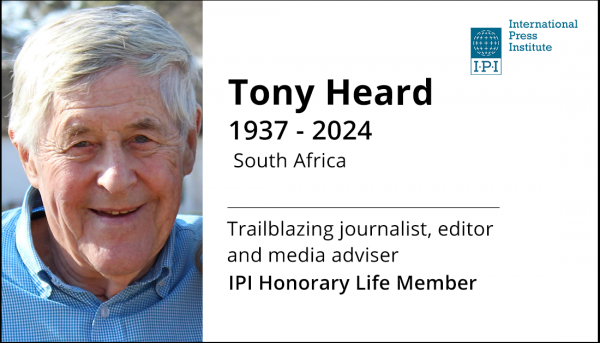Nearly 200 journalists gathered here at the No. 4 Old Fort Women’s Prison on a day that seemed to usher in the beginning of winter to hear the much-anticipated findings of the organization charged with designing a “gold standard” regulatory system for print media.
It was only a year-and-a-half ago that observers from around the world – including my own organization, the International Press Institute (IPI) – cried foul as the African National Congress (ANC) increased its pressure on Parliament to consider implementing a statutory Media Appeal Tribunal for print media, an idea it initially introduced in 2007.
In 2010, my colleagues and I boarded a plane for an emergency mission to Johannesburg directly from a press freedom mission to Zambia. In Johannesburg, IPI joined with its members and supporters on the ground to lobby for a reversal of the ANC’s position. Our voice was one of many.
In July 2011, the South African National Editors Forum (SANEF) and Print Media South Africa (PMSA) responded to criticism of how the Press Council of South Africa dealt with complaints against the media and criticism from the public – particularly the ANC – regarding “shoddy” journalism, by establishing the nine-member Press Freedom Commission, whose job it was to thoroughly study the self-regulatory process in the country and come up with a plan by March 2010.
So yesterday, I also sat with anticipation in a building gracing the grounds of a prison that held the likes of journalists such as Mathatha Tsedu during the Apartheid years. “I think it is fitting that we are gathered in the Old Fort to discuss the threatening of journalism,” Tsedu, who serves as project director of the Press Freedom Commission, said yesterday. “Some of the best journalism was done here.”
Like all the other journalists in the room, I hoped that this independent body of eight non-media professionals and one foreign media representative would give my colleagues in South Africa well-thought-out and defined recommendations for an enforceable self-regulatory system that would not infringe on press freedom values.
In his introduction, Pius Langa, chairman of the PFC, gave me hope: “We believe we have come up with a solution (to concerns about weak media regulation) in a way that insures press freedom while at the same time protecting the privacy and dignity of people.”
The Commission was established in July 2011, to look into four main types of regulation: self regulation, co-regulation, independent regulation, and state regulation, in order to determine which type would be best for South Africa to develop a more effective media regulation.
The nine committee members also travelled to four different countries – Tanzania, India, Denmark, and the United Kingdom – to study diverse forms of media regulations and help decide which recommendations would best fit South Africa.
So with the opening of a Power Point presentation by Dr. Phil Mthimkulu, spokesman for the PFC, I held my breath.
Here is what the committee had recommended:
PUBLIC PARTICIPATION
First of all the PFC wants more public participation in the Press Council of South Africa (PCSA) and in the Appeals Committee, with more members of the public and a reduced number of press members. The PFC proposed “independent co-regulation for the print media industry of South Africa”, without the state or government participating. The PFC suggested that the PCSA should be physically separated from publishers and editors, in order to maintain its independence.
JOURNALISTS AND PROFESSIONALISM
The PFC says journalists should be well versed with the Press Code, and that they should even be tested regularly on it. “Journalists should actually know the press code like the Bible. They should dream the press code in as many languages as possible,” said Mthimkulu, to a chorus of laughter.
The PFC recommended that the PCSA develop a “hierarchy of sanctions” for wrong doing, starting with corrections and apologies, and finishing with space fines (refers to space in the publication being used to address the mistake/offence), monetary fines and even expulsion, in order to assure that journalists adhere to a strict professional and ethical standard. Monetary fines, which have not been determined at a fixed amount, and expulsion are for serious cases only.
The exceptions to the right of reply, (the right to defend oneself against public criticism) to serious criticism, should be limited to unavailability and unwillingness to respond. The PFC argues that the current defences allow the destruction of evidence and the obstruction of publication through court orders. The PFC maintains that the right of reply should be “explicit” in cases to do with privacy, dignity, and reputation.
The PFC has also called for “holistic coverage on children” and a ban on pictures and articles about children which could be harmful to them. Hate speech is prohibited in the Code, rather than just the Preamble to the Code.
COMPLAINTS
The PFC recommends that there are no waiver requirements in the complaint procedures, and the complaints procedure is no longer seen to be arbitration, in order to make the system more accessible. The PFC also said those unhappy with the proceedings should be able to seek legal action. The PFC wants to allow third party complaints, so that anyone can act in the public’s interest to lodge a complaint, even if they are not directly affected. The PFC also suggested introducing a Public Advocate, who can initiate cases in the interest of the public, even if no complaints have been made.
After the unveiling of the recommendations, I was curious to see what our Executive Board Member in South Africa, Ferial Haffajee, Editor-in-Chief of City Press, had to say. She was optimistic: “We welcome the Press Freedom Commission report for strengthening the system of regulation while protecting the freedom and independence of the media. The recommendations are tough (even draconian in parts) … [and] should make journalism stronger,” she said.
I, too, cautiously welcomed the Commission’s recommendations. The new guidelines should be enough to deflect the ANC’s criticism, while at once fortifying ethical and independent journalism in South Africa.


